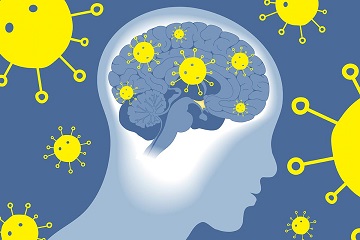Individuals With Acute Ischemic Stroke And COVID-19 Showed Higher Rates Of Intracranial Bleeding Issues And Worse Clinical Outcomes!
Source: Medical News - COVID-19 - Strokes Nov 14, 2022 3 years, 1 month, 4 weeks, 1 day, 12 hours, 17 minutes ago
A new study by The Global COVID-19 Stroke Registry which comprises of over 39 researchers from over 40 institutions across the world has found that individuals with acute ischemic stroke and COVID-19 showed higher rates of intracranial bleeding complications and worse clinical outcomes!

It is already known that COVID-19 related inflammation, endothelial dysfunction and coagulopathy may increase the bleeding risk and lower efficacy of revascularization treatments in patients with acute ischemic stroke.
The study team however aimed to evaluate the safety and outcomes of revascularization treatments in patients with acute ischemic stroke and COVID-19.
The research involved a retrospective multicenter cohort study of consecutive patients with acute ischemic stroke receiving intravenous thrombolysis (IVT) and/or endovascular treatment (EVT) between March 2020 and June 2021, tested for SARS-CoV-2 infection. With a doubly-robust model combining propensity score weighting and multivariate regression, the research team studied the association of COVID-19 with intracranial bleeding complications and clinical outcomes. Subgroup analyses were performed according to treatment groups (IVT-only and EVT).
In the study involving a total of 15128 included patients from 105 centers, 853 (5.6%) were diagnosed with COVID-19. 5848 (38.7%) patients received IVT-only, and 9280 (61.3%) EVT (with or without IVT).
The study found that patients with COVID-19 had a higher rate of symptomatic intracerebral hemorrhage (SICH) (adjusted odds ratio [OR] 1.53; 95% CI 1.16–2.01), symptomatic subarachnoid hemorrhage (SSAH) (OR 1.80; 95% CI 1.20–2.69), SICH and/or SSAH combined (OR 1.56; 95% CI 1.23–1.99), 24-hour (OR 2.47; 95% CI 1.58–3.86) and 3-month mortality (OR 1.88; 95% CI 1.52–2.33).
Also, it was found that COVID-19 patients also had an unfavorable shift in the distribution of the modified Rankin score at 3 months (OR 1.42; 95% CI 1.26–1.60).
The study findings clearly showed that individuals with acute ischemic stroke and COVID-19 showed higher rates of intracranial bleeding complications and worse clinical outcomes after revascularization treatments than contemporaneous non-COVID-19 treated patients.
Present available data however does not allow direct conclusions to be drawn on the effectiveness of revascularization treatments in COVID-19 patients, or to establish different treatment recommendations in this subgroup of patients with ischemic stroke.
The study findings can be taken into consideration for treatment decisions, patient monitoring and establishing prognosis.
The study findings were published in the peer reviewed journal: Neurology (The medical journal of the American Academy of Neurology).
https://n.neurology.org/content/early/2022/11/09/WNL.0000000000201537
The study findings showed that people with a COVID-19 infection who have an ischemic stroke may be more likely to have bleeding in their brain and worse outcomes during stroke treatments to restore blood flow than people without COVID-19.
Typically, an ischemic stroke is caused by a blockage of blood flow to the brain and is the most common type of stroke.
Study author Dr João P
edro Marto, MD, of Hospital Egas Moniz in Lisbon – Portugal told Thailand
Medical News, "While we know that COVID-19 may affect an individual's health in many ways, not much is known about the safety and effectiveness of treatments to restore blood flow for those who have had an ischemic stroke. Our research found that individuals who had an ischemic stroke and COVID-19 had higher rates of brain bleeding and were more likely to have worse outcomes, including death, than those without COVID-19."
The research involved 15,128 individuals with an average age of 72 from 30 countries across five continents who had an ischemic stroke. All had treatments to restore blood flow. Of the total, 5,848 people, or 39%, received intravenous thrombolysis treatments, which are injections of clot-busting drugs, only. The other 9,280 people, or 61%, received endovascular treatments, which can include using a stent to remove a clot, or both methods. Of the total participants, 853, or 6%, had COVID-19.
The study team looked at how often people had two types of complications: intracerebral hemorrhage, which is a type of bleeding within the brain; and subarachnoid hemorrhage, which is bleeding between the brain and the membrane that covers it.
Interestingly, when comparing individuals with COVID-19 to those without, 9% had intracerebral hemorrhage compared to 5%, 4% had subarachnoid hemorrhage compared to 2%, and 10% had both complications compared to 6%.
Upon adjusting for factors such as age, sex and blood glucose levels, the study team found that individuals with COVID-19 had a 53% higher risk of intracerebral hemorrhage compared to individuals without COVID-19.
Also, it was found that those who had COVID-19 also had an 80% higher risk of subarachnoid hemorrhage compared to those without COVID-19. When looking at both complications combined, individuals with COVID-19 had a 56% higher risk compared with individuals without COVID-19.
The study team also found that those with COVID-19 were more than twice as likely to die within 24 hours after stroke treatment compared to people without COVID-19. They were also 88% more likely to die within three months.
Dr Marto added, “Though our research found a higher rate of brain bleeds in individuals with COVID-19, the number of individuals who experienced complications was still small. We believe treatments to restore blood flow remain beneficial to individuals with ischemic stroke and COVID-19 and suggest they continue to be given as quickly as possible using current treatment recommendations. Our study findings can be taken into consideration for treatment decisions and monitoring people after stroke."
The study team admitted that a limitation of the study is that they were not able to collect data on the specific virus variants, which could have influenced the results.
For the latest
COVID-19 Research, keep on logging to Thailand
Medical News.
